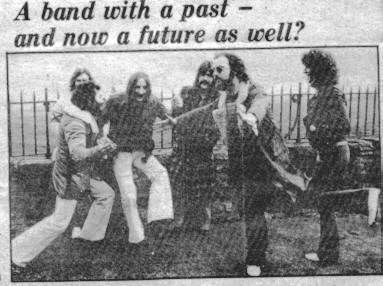| Happy Daze - a review |
| by Steve Clark |
| provided by Michael Clayton |
|
|

|
| Happy Daze - a review |
| by Steve Clark |
| provided by Michael Clayton |
|
|

|
A band with a past – and now a future as well?
It’s only three, maybe four years since Lindisfarne sold more albums than anyone else in Britain. Think what they’ve come up with since and how quickly their popularity ratings have fallen. Now they’ve changed labels.Lindisfarne no longer on Charisma? Hardly seems possible. Lindisfarne, for a while at least, were Charisma. What’s more they’ve split from Tony Stratton-Smith, Charisma’s boss and their manager, and are now under new management and recording for a new label. They needed a change because their last album (incidentally their last for Charisma, and first with a new line up) wasn’t a lot of bottle; it sounded as though it was difficult to make.
Happy Daze is a different story and, although I doubt whether it’s going to restore their old reputation over-night, Lindisfarne now sound as though they have some kind of future. They sound like a band, even though there are three writers in the group – Alan Hull, Kenny Craddock and Tommy Duffy. Hull ahs always been regarded as Lindisfarne’s strongest writer but Happy Daze shows the emergence of Craddock as a song writer whose songs are well worth listening to.
Two of the album’s best cuts are his songs, In Your Head and Tomorrow. The other real standouts are Hull’s River and Duffy’s Tonight, (the single), but that takes a lot of listening before coming through as something strong. Lyrically Happy daze is for a lot of the time a down album. Two songs, Hull’s Gin And Tonix All Round and Duffy’s The Man Down There, are against the management class in general. Hull’s song is a straight piece of autobiography with a direct reference to Stratton-Smith. He is almost full of scorn as he sings, “The young boy from the south, whose father owns a wishing well, speaking words of wisdom, so I told him to go to hell.” And yet Hull has no real malice in him, - “Felt a little insecure, didn’t mean to hurt you.”
Duffy’s put down of the bosses shows no such compunction with lines like, “Well the boss man is clever, he always will be, he’s getting rich from the likes of you and me.” Then there’s Hull’s song about a woman who let him down, You Put The Laff On Me. Craddock’s In Your Head could be about be-devilment while Tomorrow is a sad song, though not without hope. Throughout the lyrics are consistently intelligent although they come from different minds.
But the music? Well, Lindisfarne are more musical than they’ve ever been. Eddie Offord (yes the self same Eddie Offord responsible for turning the knobs with Yes and ELP) has made an excellent job of the production which is really crisp, buoyant and colourful, with horns augmenting the group here and there. Whether it’s Offord or the band, there does seem to be a certain amount of Beatle influence in the arrangements. Take In Your Head for instance which has a kind of Lady Madonna sax built into the song. It’s a very neat, well played and marred only by Duffy’s singing (he sings one verse) which does go a little over the top. The following cut, Hull’s River, an acoustic song, contrasts perfectly with its simple instrumentation. Hull’s remaining songs tend to be too much like other tunes he’s written and are okay, while River is something special. His No Need To Tell Me is the kind of song you’d hear being sung late at night in a pub and has to be seen as a filler. Craddock’s Nellie, a song about harvest time, is Lindisfarne at their most traditional, and a very appealing song at that. But his closing Tomorrow must be Craddock’s strongest tune on the album. It tells of deserted streets and sadness and the instrumentation, particularly Ray Jackson’s (Jackson does a lot of singing on Happy Daze) mandolin and harmonica playing, fits the mood perfectly.
So Lindisfarne are back on the right course and even if Happy Daze isn’t a sensational record, it shows an English group playing and writing songs that are largely above the average.